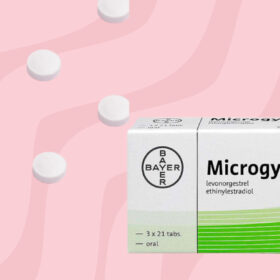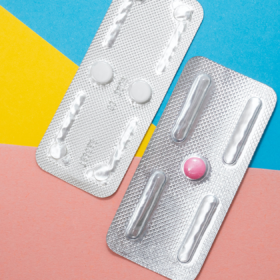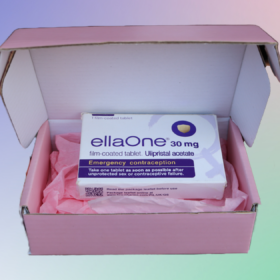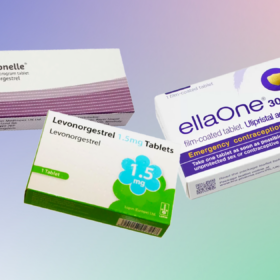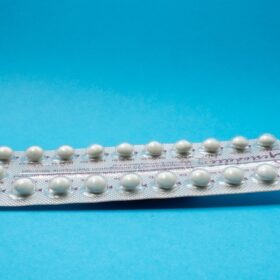
Does the morning after pill affect your menstrual cycle?
In this article
What's the lowdown?
The morning after pill disrupts the follicular phase of the menstrual cycle to delay ovulation
Common side effects of the morning after pill include irregular bleeding or spotting, plus changes to cycle length and heaviness of flow
The morning after pill can cause a delay to your next period, although some studies suggest it’s likely to cause it to arrive earlier
You can buy the morning after pill directly from The Lowdown
To understand how the morning after pill affects your menstrual cycle, let’s quickly dive into how both the morning after pill and the menstrual cycle work. This is just an overview, but you can find more details in our guide to emergency contraception, and our blog on how the menstrual cycle works.
How does the menstrual cycle work?
There are three distinct phases of the menstrual cycle:
- The follicular phase, which takes place before ovulation. When you start your period, this is the start of the follicular phase (we’ll dig into this shortly)
- Ovulation, where a follicle (a tiny bag of fluid in an ovary containing an egg) releases a mature egg which moves into the fallopian tube ready to be fertilised. It stays alive for 12-24 hours, then is flushed out of the body if it doesn’t bump into a sperm (fertilisation)
- The luteal phase, which happens after ovulation. Hormones work on thickening the lining of the uterus in preparation for a fertilised egg to implant and begin to break it down if fertilisation hasn’t occurred, which leaves the body as a period, beginning the follicular phase and the whole thing starts over again.
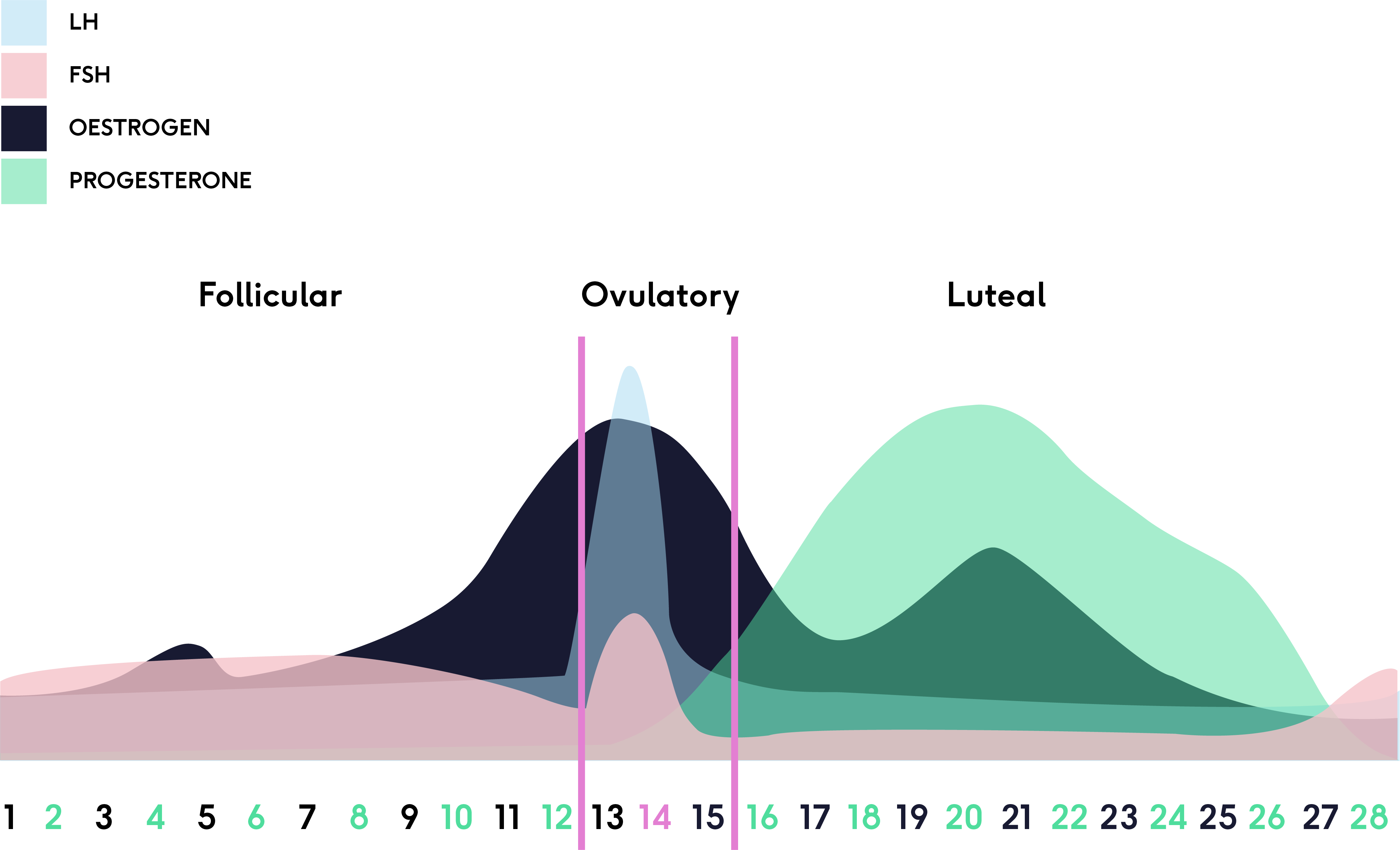
For the purposes of learning how the morning after pill affects your menstrual cycle, we just need to focus on the follicular phase. So, your period has started, meaning the follicular phase has begun. Oestrogen and progesterone levels are low, so the follicular stimulating hormone (FSH) does its thing. Rising levels of FSH cause the most advanced follicle to mature, growing big enough to produce large amounts of oestrogen, which triggers the luteinising hormone (LH). It’s LH’s job to let the follicle know it’s time to release the egg, moving into the ovulatory phase.
The morning after pill, when used correctly, interrupts this phase in a particular way. Which leads us to…
How does the morning after pill affect your menstrual cycle?
The primary function of the morning after pill is that it delays ovulation, so fertilisation between a sperm and egg cannot occur. Levonorgestrel-based morning after pills like Levonorgestrel, Levonelle, LoviOne, Ezinelle and Plan B work in a slightly different way to ellaOne, but ultimately they both work to delay ovulation.
Sperm can stay alive in the female genital tract around 5 days after sex. So if ovulation occurs within those 5 days, or just before, you could be at risk of pregnancy as fertilisation may occur
So, to use the morning after pill correctly you need to be at the point of your menstrual cycle where you haven’t yet ovulated. If you take it after ovulation, it’s highly likely that it won’t work. This isn’t to say that you shouldn’t take it, or that you will become pregnant, but you may need to seek alternative emergency contraception in the copper coil (IUD).
Because the morning after pill delays the ovulatory phase of your menstrual cycle, this can have a knock on effect on when and how your next period arrives…
How does the morning after pill affect your period?
A common side effect of using the morning after pill includes a temporary impact on your menstrual cycle. It can be longer, shorter, heavier, lighter, earlier or delayed… you get the jist. All of these changes should only last for one cycle before your period returns to what is normal for you.
When studying the bleeding patterns after using the levonorgestrel morning after pill, researchers found that out of 232 participants, 14% experienced irregular bleeding, changes in menstrual cycle length, period length and menstrual appearance compared to the usual characteristics of their period¹. Another study found that only irregular bleeding occurred in only 5% of women in the first cycle after taking the morning after pill⁴.
Irregular bleeding that’s out of the ordinary for you following a one off dose of the synthetic hormone in the morning after pill is likely due to a breaking down of the lining of the womb, which can lead to bleeding and spotting². This bleeding shouldn’t be excessive or prolonged, so if you’re bleeding heavily after using Levonorgestrel, Levonelle, Ezinelle, Plan B or ellaOne morning after pills, speak to a healthcare professional to make sure there’s no other underlying cause.
Does the morning after pill delay your period?
As with most contraception, everyone is different. Some people will experience no changes to their menstrual cycle after using the morning after pill, some will find theirs is quite different from their usual length or heaviness of flow.
One study³ of 544 participants looked at vaginal bleeding after taking a single dose of the levonorgestrel morning after pill and 69% found that their period was early, while 21% found their period was delayed by more than a week. Another smaller study⁴ found that taking levonorgestrel in the first 3 weeks of the menstrual cycle caused periods to arrive earlier, shortening that menstrual cycle. In contrast, the length of their first period after taking the pill increased the later in the cycle the pill was taken and was longer in participants who used the morning after pill than in those who did not⁴.

As the morning after pill delays ovulation, this can mean your next period may arrive later than usual. So, if your next period hasn’t turned up when it was supposed to – don’t panic. Always take a pregnancy test 3 weeks after using the morning after pill, even if you do get your period on time, to make sure it’s worked. You can buy 2 Clearblue pregnancy tests from Amazon (affiliate link).
Other side effects of the morning after pill include⁵:
- Headache
- Stomach ache
- Nausea
- Vomiting – just like the contraceptive pill, this can make the morning after pill less effective. You will need to take another dose if you’ve vomited within 2 hours of taking levonorgestrel and 3 hours of taking ellaOne. Or, consider having a copper IUD fitted
Does the morning after pill affect your hormones?
You don’t have to worry about the morning after pill messing with your hormones. There are no long-term side effects on your body or fertility from using the morning after pill. It’s safe to use and any changes to your menstrual cycle or physical side effects are temporary.
Our medical review process
This article has been medically reviewed for factual and up to date information by a Lowdown doctor.


